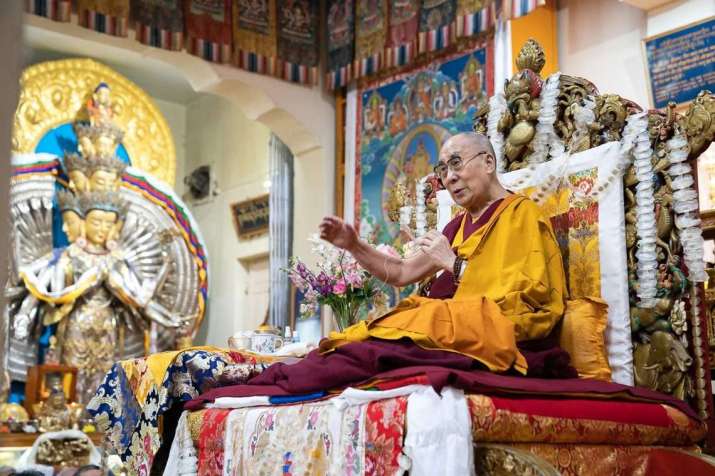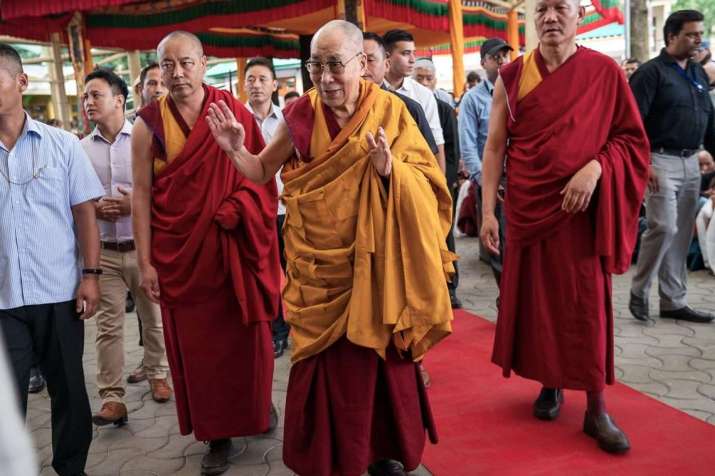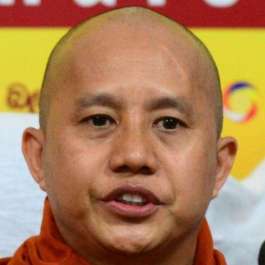
Senior Chinese officials have issued a stern caution to India that not following Beijing’s lead concerning the issue of the Dalai Lama’s reincarnation could damage bilateral political ties, Indian media outlets reported over the weekend. The future of the Dalai Lama lineage, they said, can only be decided in China and any interference by India may impact Sino-Indian relations.
“The reincarnation of the Dalai Lama is a historical, religious, and political issue. There are established historical institutions and formalities for the reincarnation of the Dalai Lama,” Wang Neng Sheng, a vice minister in the Tibet Autonomous Region, told a gathering of Indian journalists in the former Tibetan capital Lhasa. “The Dalai Lama’s reincarnation is not decided by his personal wish or by some group of people living in other countries.” (Business Standard)
The issue of who will succeed His Holiness the Dalai Lama, who turned 84 on 6 July,* has gained increasing weight as a point of dispute in recent years in light of His Holiness’ age and reported health issues. As the head of the Gelug school of Vajrayana Buddhism and the principal figurehead for Tibetan Buddhism, the spiritual leader continues to wield significant influence among ethnic Tibetans in China and overseas. The next Dalai Lama would be the 15th incarnation over an unbroken lineage that has lasted some 500 years.
Wang, who was also identified as holding the post of director-general in the government of the Tibet Autonomous Region, noted that the current Dalai Lama was recognized by Beijing and that any successor must be identified through traditional methods in two stages: “It must go to draw of lots in the golden urn, and the reincarnation must be recognized by the central government,” he said, adding that the “centrality” of the central government must be recognized and that any personal move by the incumbent Dalai Lama on the issue would not be recognized by Beijing. (NDTV)
“It was with the central government’s recognition that the Dalai Lama became the 14th Dalai Lama. Otherwise, he wouldn’t have been in that position,” Wang emphasized. (NDTV)
In addition to diplomatic ties with China, India also needs to consider the implications with regard to the broader Tibetan diaspora. Many of the more than six million Tibetans in China continue to honor the Dalai Lama, although Beijing has prohibited displays of his image and public demonstrations of devotion, maintaining that the Nobel laureate is a divisive element who encourages violence and separatist activity in ethnically Tibetan regions. However, His Holiness has repeatedly stated that he only wishes to see autonomy for Tibet while it remains a part of China.
“This can turn into a major political difference that would affect ties [if India doesn’t recognize the Dalai Lama chosen by China]. But no wise leader or friendly country will do that,” said Prof. Zha Luo, director of the Institute of Social and Economic Studies of the China Tibetology Research Center (CTRC), a government Tibet policy think tank in Beijing. “Of course, India can also stay away [and not publicly endorse him]. India, though, should respect China’s right to deal with its [internal] social and domestic issues.” (The Times of India)
Zha also noted that if Indian leaders continued to make “frequent visits” to the northern Indian state of Arunachal Pradesh, which China regards as disputed territory and refers to as “South Tibet,” this would also have an “adverse effect” on Sino-Indian relations. “It is better to avoid hotspots,” he added. (Deccan Chronicle)

Since the turn of the century, Buddhism has emerged as a major strategic tool in the “soft diplomacy” efforts of Asia’s emerging economic behemoths China and India. The governments of both countries have been active in promoting their respective Buddhist histories, jockeying to positions themselves as cradles of Buddhist thought and culture in order to bolster their political power with the weight and reach of Buddhism’s political, cultural, and spiritual influence—both domestically and internationally.
The Indian government has maintained a consistent official stance on the issue of the Dalai Lama. ”[The] government of India’s position on His Holiness the Dalai Lama is clear and consistent. He is a revered religious leader and is deeply respected by the people of India. There is no change in that position,” a Ministry of External Affairs spokesperson told a media briefing in March last year. “His Holiness is accorded all freedom to carry out his religious activities in India.” (Business Standard)
In an exclusive interview in March this year, the Dalai Lama told Reuters that following his own death, his next incarnation might be recognized in India, where he has lived in exile since 1959.
“China considers Dalai Lama’s reincarnation as something very important. They have more concern about the next Dalai Lama than me,” His Holiness said. “In future, in case you see two Dalai Lamas come, one from here [India], in free country, one chosen by Chinese, then nobody will trust, nobody will respect [the one chosen by China]. So that’s an additional problem for the Chinese! It’s possible, it can happen.” (Reuters)
His Holiness has also previously suggested that the lineage of the Dalai Lama could end when he dies. “The Dalai Lama institution will cease one day. These manmade institutions will cease,” His Holiness said in 2014. “There is no guarantee that some stupid Dalai Lama won’t come next, who will disgrace himself or herself. That would be very sad. So, much better that a centuries-old tradition should cease at the time of a quite popular Dalai Lama.” (BBC)
In a public statement in 2011, the Dalai Lama emphasized, “Reincarnation is a phenomenon which should take place either through the voluntary choice of the concerned person or at least on the strength of his or her karma, merit, and prayers. Therefore, the person who reincarnates has sole legitimate authority over where and how he or she takes rebirth and how that reincarnation is to be recognized. It is a reality that no one else can force the person concerned, or manipulate him or her.” (The Office of His Holiness the Dalai Lama)
Born Lhamo Thondup in 1935 in the hamlet of Taktser in northeastern Tibet, the incumbent Dalai Lama was identified as the reincarnation of his predecessor when he was just two years old. The Dalai Lama escaped from Lhasa in 1959, fleeing to India, which is now home to about 100,000 Tibetans living in exile. His Holiness has won numerous awards and accolades over his lifetime, and in 1989 was a recipient of the Nobel Peace Prize for his campaign to find a peaceful resolution for the people of Tibet based on non-violence and dialogue.
* Dalai Lama Marks 84th Birthday with Call for a More Compassionate, Harmonious Society (Buddhistdoor Global)
** Beijing Rejects Dalai Lama’s Assertion that Next Incarnation May Be Born in India (Buddhistdoor Global)
See more
India should not interfere in selection of Dalai Lama’s successor: China (Business Standard)
India Shouldn’t Interfere In Choice Of Dalai Lama’s Successor: China (NDTV)
Disregard for China’s Dalai Lama could affect ties: Beijing (The Times of India)
India must approve next China Dalai for better ties: Prof Zha Luo (Deccan Chronicle)
China warning over meddling on Dalai successor (The Telegraph)
Exclusive: Dalai Lama contemplates Chinese gambit after his death (Reuters)
Reincarnation (His Holiness the 14th Dalai Lama of Tibet)
Dalai Lama concedes he may be the last (BBC)
State Religious Affairs Bureau Order No. 5 (Wikipedia)
His Holiness the 14th Dalai Lama of Tibet














